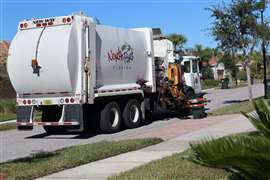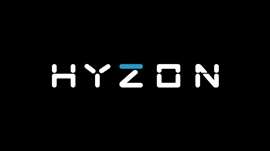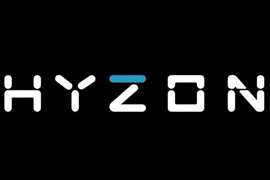Hyzon and New Way on why hydrogen fuel cells address refuse vehicle challenges
28 February 2024
The refuse vehicle industry is facing several challenges. Hyzon Motors and New Way Trucks believe fuel cell electric vehicles (FCEV) can overcome them.
Finding alternative power sources to reduce emissions in refuse collection vehicles (RCV) can be particularly challenging for truck OEMs.
“Refuse is a difficult environment,” said Don Ross, chief sales officer for refuse truck maker New Way Trucks and board chair of the National Waste & Recycling Association. “It is a high cycle time environment. It’s carbon-intense for a lot of different reasons.”
Addressing tightening emissions regulations meant many in the industry had turned to compressed natural gas (CNG).
“The industry likes compressed natural gas for a number of reasons,” Ross said. “Number one, it’s a domestic fuel source. They run quiet, as well.” He added that CNG also avoided the price volatility inherent in diesel fuel.
Needing Zero Emissions
However, CNG is not a zero-emission fuel. This is becoming more of a concern due to tightening emissions regulations.
 A New Way refuse collection vehicle (RCV) at work in North Port, Fla. (Photo: Alamy)
A New Way refuse collection vehicle (RCV) at work in North Port, Fla. (Photo: Alamy)
“There are places like California and other states that have even stricter emission regulations forthcoming,” Ross said. “The California Air Resources Board is really trying to get to zero [emissions], and unfortunately CNG does not qualify. That’s why I think there was a shift to the next technology, which was battery electric (BE). But with battery electric comes a number of compromises.”
He said that some of those compromises include charging the batteries and dealing with the weight of carrying them around. New Way’s customers want to haul as much as they legally can to be as productive as possible, Ross said.
“The DOT (U.S. Department of Transportation) payload regulations and what fits inside that envelope is critical,” he said. “They’re very sensitive to weight, and there are not a lot of alternative fuel sources that can meet that high-horsepower demand.”
In early February 2023, New Way and hydrogen fuel cell technology developer Hyzon Motors announced a joint development agreement (JDA) to develop a hydrogen fuel cell-powered refuse vehicle for the North American market. The companies said they see fuel cell electric vehicles (FCEV) overcoming challenges the industry is facing.
Lighter Electric Power
Pat Griffin, president of Hyzon North America, said that FCEVs, for instance, offer weight advantages over battery electric refuse vehicles.
“With the BEV (battery electric vehicle), due to the need to power all of the auxiliary equipment in the compactor on board the body, run the route and have enough to get home, you have to carry a lot of capacity on board — battery storage capacity,” he said. “That’s typically over 300 kilowatt hours, ranging up to near 400 kilowatt hours on board. Whereas in a fuel cell electric vehicle, we’re carrying 55 kilowatt hours on board of battery storage because we’re producing electricity.”
He added that the reduction in battery capacity results in a weight reduction of as much as 8000 lbs. compared to a BEV. Ross said refuse haulers would view that as an 8000-lb. penalty in a BEV, because it would mean they would not be able to haul that amount.
“Our customers, you know, they haul trash by the ton,” Ross said. “They charge by the ton. They dispose by the ton.”
Griffin said Hyzon’s fuel cell technology in particular offers weight and space advantages over other approaches.

“The advantage of ours is it’s a single stack fuel cell,” he said. “Comparatively speaking, it’s a single engine as opposed to banking multiple fuel cells together, which has been the only way it’s been done to this point with that much power. It gives us a 30 percent reduction in volume, which means packaging is improved, gives us 25 percent reduction in manufacturing costs [and a] 30 percent reduction in total weight.”
Griffin added that the single stack fuel cell also improves fuel efficiency, “which means I can go further on a route, I can pick up more trash, I have zero range anxiety in that market space.”
Ross said the size and weight issues surrounding BE technology also limits the kinds of collection vehicles to which it can be applied.
“Your standard refuse collection bodies across the full spectrum of services that our industry provides,” he said, “whether that’s small bin collection, whether that’s residential collection, whether that’s transfer station movement — basically all the equipment we use today can be adapted to hydrogen fuel cell technology, we think, without any limitation at this point.”
Quieter Operation
Another benefit Ross and Griffin noted regarding a fuel cell electric refuse truck concerns noise.
“We’ve spent a lot of time in front of boards and commissions talking about noise abatement,” Ross said. “This technology is going to solve a lot of that.”
Griffin added, “Much like a battery electric car, what you hear coming down the road is tire noise. So, that’s really the significant reduction you hear — is that exhaust emission and decibel is depleted with FCEV.”
Ross added that the reduction in noise, particularly that associated with some BE refuse vehicles New Way has deployed in the past, has led to an unusual request from some customers.
“We’ve had some customers say, ‘Is there’s some kind of noise generator that you can put on these trucks?’ for, number 1, safety so they can hear it coming,” he said, “But number two, people — they don’t put their garbage out until they hear the garbage truck coming down the road.”
STAY CONNECTED




Receive the information you need when you need it through our world-leading magazines, newsletters and daily briefings.
POWER SOURCING GUIDE
The trusted reference and buyer’s guide for 83 years
The original “desktop search engine,” guiding nearly 10,000 users in more than 90 countries it is the primary reference for specifications and details on all the components that go into engine systems.
Visit Now
CONNECT WITH THE TEAM











